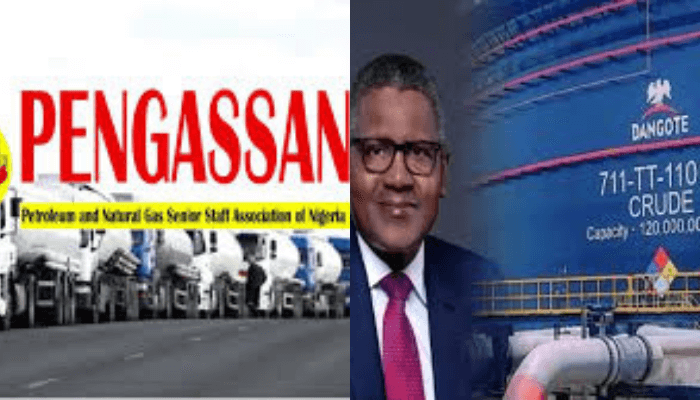Dangote Refinery dispute: FG, prominent Nigerians call for restraint to protect investor confidence
FG should file lawsuit against PENGASSAN – Ex state attorney-general
A group of prominent Nigerians, including religious leaders, economists, civil society advocates, and former public officials, have issued a joint statement calling for restraint, dialogue, and respect for both workers’ rights and national economic interests in the wake of recent labour unrest at the Dangote Refinery.
Last week, members of the Petroleum and Natural Gas Senior Staff Association of Nigeria (PENGASSAN) embarked on strike over the alleged sack of about 800 unionised employees at the refinery. The industrial action was suspended following the intervention of the minister of labour and employment, Muhammad Dingyadi, and Nuhu Ribadu, the national security adviser.
In the statement dated October 6, 2025, the signatories, including Emir of Kano, Khalifa Muhammad Sanusi II, Atedo Peterside, Bishop Matthew Kukah, and former SEC DG Arunma Oteh said the refinery represents “a national symbol of what bold domestic investment can achieve” and must be protected from disruptions that could deter investors.
Other signatories include Abubakar Siddique Mohammed, Salamatu Hussaini Suleiman, Dudu Mamman Manuga, Ibrahim Dahiru Waziri, Obonganwan Barbara Etim James, Opeyemi Adamolekun, Osita Chidoka, Senator Sola Akinyede, and Aisha Yesufu.
Read also: Cooking gas prices hit N3200/kg despite end of Dangote, PENGASSAN strike
“For decades, Nigerians endured the collapse of government-owned refineries, the waste of trillions of naira in subsidies, and dependence on fuel imports,” the statement read.
“These failures left citizens exposed to scarcity, inflation, and insecurity. In this context, the Dangote Refinery represents more than a private venture; it is a national symbol of what bold domestic investment can achieve.”
The group noted that the refinery’s operations have already begun easing fuel supply pressures across the country, leading to a 55 percent reduction in petrol prices in some areas, from about N1,500 per litre to around N820.
“This impact on transport costs and food prices offers Nigerians a glimpse of how local productivity can improve daily life,” they said. “It also signals to investors at home and abroad that industry, rather than speculation, can still thrive in Nigeria.”
However, they cautioned that the strikes and threats that recently disrupted operations at the refinery “send the wrong signals” to investors at a time when Nigeria needs stability and confidence to attract capital and innovation.
The statement outlined three guiding principles for managing such disputes: respect for workers’ rights, protection of markets and productivity, and adherence to social responsibility by large investors.
The signatories also called for transparent and lawful handling of concerns around monopoly or market dominance, urging stakeholders to use appropriate government institutions such as the Federal Competition and Consumer Protection Commission (FCCPC) instead of resorting to strikes.
“Concerns about monopoly or market dominance should not be settled by disruptive industrial action,” they said. “There is no legal monopoly here; others are free to invest in refining, provided they can mobilise the necessary resources and expertise.”
Vice President Kashim Shettima on Monday called on Nigerians to safeguard and respect the multibillion-dollar investment, describing the $20 billion refinery as a “national treasure” that must not be undermined by industrial disputes or political sentiment.
Speaking at the opening of the 2025 Nigerian Economic Summit (NES) in Abuja, Shettima said the 650,000-barrel-per-day refinery, one of the largest in the world, was central to Nigeria’s ambition for energy security, job creation, and global competitiveness.
Shettima, while commending the government’s mediation, urged labour unions and the organised private sector to exercise restraint and patriotism in resolving disputes, warning that reckless actions could jeopardise national progress.
“It’s not about holding the whole nation to ransom because of a minor labour dispute,” he said. “Nigeria is greater than PENGASSAN. Nigeria is greater than each and every one of us.”
Reacting to Shettima’s remarks, a former state attorney-general and public policy expert, who asked not to be named, said the vice president “missed a huge opportunity” to speak directly to investors and uphold the rule of law.
“The VP spoke yesterday as he often does, with authority and erudition, but I believe he missed the chance to reassure investors that the government will enforce the law dispassionately,” he said.
According to him, existing legislation such as the Trade Disputes Act and the Trade Disputes (Essential Services) Act explicitly prohibit strike actions in the energy sector, which is classified as an essential service.
“A VP who swore to uphold the Constitution ought to have reminded the unions that no one, certainly not a trade union, is above the law,” he argued.
“A further statement that the Federal Attorney-General had been instructed to file a declaratory lawsuit against those two racketeering and blackmailing trade unions (it is not too late to do so) would, in my view, have had a more salutary effect both on the Unions’ behaviour and on the perception of domestic and foreign investors about Nigeria as an investment destination,” he said.
He cited precedents, including a 2002 court case against the National Union of Electricity Employees (NUEE), which upheld the government’s right to prevent industrial action in essential services.

